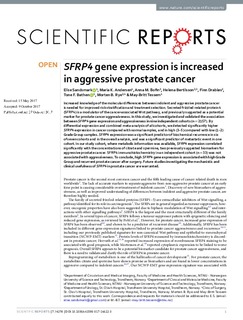| dc.contributor.author | Sandsmark, Elise | |
| dc.contributor.author | Andersen, Maria Karoline | |
| dc.contributor.author | Bofin, Anna M. | |
| dc.contributor.author | Bertilsson, Helena | |
| dc.contributor.author | Drabløs, Finn | |
| dc.contributor.author | Bathen, Tone Frost | |
| dc.contributor.author | Rye, Morten Beck | |
| dc.contributor.author | Tessem, May-Britt | |
| dc.date.accessioned | 2018-07-03T05:42:39Z | |
| dc.date.available | 2018-07-03T05:42:39Z | |
| dc.date.created | 2017-12-05T14:08:20Z | |
| dc.date.issued | 2017 | |
| dc.identifier.citation | Scientific Reports. 2017, 7 1-10. | nb_NO |
| dc.identifier.issn | 2045-2322 | |
| dc.identifier.uri | http://hdl.handle.net/11250/2504072 | |
| dc.description.abstract | Increased knowledge of the molecular differences between indolent and aggressive prostate cancer is needed for improved risk stratification and treatment selection. Secreted frizzled-related protein 4 (SFRP4) is a modulator of the cancer-associated Wnt pathway, and previously suggested as a potential marker for prostate cancer aggressiveness. In this study, we investigated and validated the association between SFRP4 gene expression and aggressiveness in nine independent cohorts (n = 2157). By differential expression and combined meta-analysis of all cohorts, we detected significantly higher SFRP4 expression in cancer compared with normal samples, and in high (3–5) compared with low (1–2) Grade Group samples. SFRP4 expression was a significant predictor of biochemical recurrence in six of seven cohorts and in the overall analysis, and was a significant predictor of metastatic event in one cohort. In our study cohort, where metabolic information was available, SFRP4 expression correlated significantly with the concentrations of citrate and spermine, two previously suggested biomarkers for aggressive prostate cancer. SFRP4 immunohistochemistry in an independent cohort (n = 33) was not associated with aggressiveness. To conclude, high SFRP4 gene expression is associated with high Grade Group and recurrent prostate cancer after surgery. Future studies investigating the mechanistic and clinical usefulness of SFRP4 in prostate cancer are warranted. | nb_NO |
| dc.language.iso | eng | nb_NO |
| dc.publisher | Nature Publishing Group | nb_NO |
| dc.rights | Navngivelse 4.0 Internasjonal | * |
| dc.rights.uri | http://creativecommons.org/licenses/by/4.0/deed.no | * |
| dc.title | SFRP4 gene expression is increased in aggressive prostate cancer | nb_NO |
| dc.type | Journal article | nb_NO |
| dc.type | Peer reviewed | nb_NO |
| dc.description.version | publishedVersion | nb_NO |
| dc.source.pagenumber | 1-10 | nb_NO |
| dc.source.volume | 7 | nb_NO |
| dc.source.journal | Scientific Reports | nb_NO |
| dc.identifier.doi | 10.1038/s41598-017-14622-3 | |
| dc.identifier.cristin | 1523088 | |
| dc.description.localcode | © Te Author(s) 2017. This article is licensed under a Creative Commons Attribution 4.0 International License, which permits use, sharing, adaptation, distribution and reproduction in any medium or format, as long as you give appropriate credit to the original author(s) and the source, provide a link to the Creative Commons license, and indicate if changes were made. Te images or other third party material in this article are included in the article’s Creative Commons license, unless indicated otherwise in a credit line to the material. | nb_NO |
| cristin.unitcode | 194,65,25,0 | |
| cristin.unitcode | 194,65,15,0 | |
| cristin.unitcode | 194,65,1,0 | |
| cristin.unitname | Institutt for sirkulasjon og bildediagnostikk | |
| cristin.unitname | Institutt for klinisk og molekylær medisin | |
| cristin.unitname | MH fakultetsadministrasjon | |
| cristin.ispublished | true | |
| cristin.fulltext | original | |
| cristin.qualitycode | 1 | |

